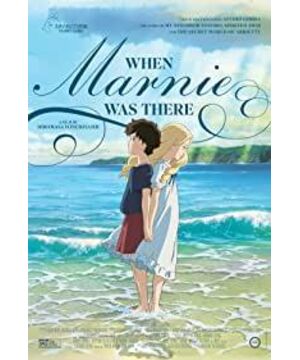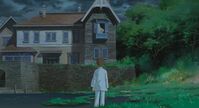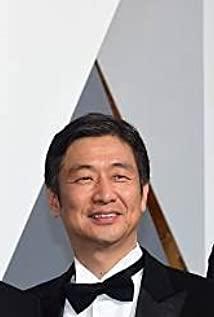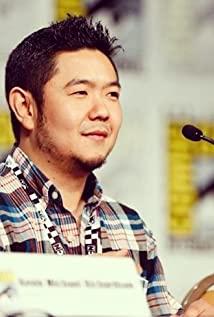Ghibli unearthed new director Hiroshi Mirin when Miyazaki's hero was twilight. "Marnie in Memories" is his second animated film and the first to be completely independent, leaving Hayao Miyazaki's direction. Overall it's pretty good. The film tells the story of Anna, a girl who has lost a blood relative, and is increasingly miserable in raising a family. The departure of her parents and the death of her grandmother made her particularly sensitive to being "abandoned", so much so that in a painting class, the teacher did not take over her paintings because she went to check on the declining children, which made her suffer a huge blow . On the other hand, because the foster family received government subsidies, Anna began to doubt the new family's attitude towards her and the authenticity of her love. She was full of distrust and disgust at the fact that she was in foster care. So much so that an unintentional question from a friend at a later festival made her furious.
As a coming-of-age movie, Anna is sent to a new place by her mother. This is a particularly mythical passage in the growth process. For example, in Spirited Away, the heroine, who hates moving, rides in her parents' car and travels through a dark tunnel to a mythical world. My parents turned into pigs because they ate local food without invitation, and I could only face the difficulties and emotions of this mythical world alone. The same goes for Marnie in Memory. Away from the city, the couple who hosted her were generous and cheerful people who gave Marnie the freedom of self-discovery. With a sketchbook, Marnie explores the countryside at will. The funny thing is, whether it's me or you, when faced with difficulties or sadness, you always have to walk aimlessly on the streets, in the fields, and aimlessly. Is it just to evacuate the mood, or to find your own fabulous villa on the other side of the lake, who can tell?
While searching, Marnie found a western-style villa like a painting. There should be people living in such a beautiful villa. she thinks. Growing up, there was always such an image. For example, in Masaaki Yuasa's "The Song of Dew that Announces Dawn", the male protagonist met a mermaid and took him to dissolve the iceberg in his heart. Anna also dreamed of someone. Who will she be? Anna started to make up stories for this person, named Marnie, and asked Marnie to invite her to the villa to play, to be friends, and to say that she loved herself. She imagined Marnie taking her to a picnic with juice like a magic potion. She imagined Marnie having a wonderful family, charming parents. She imagined Marnie beautiful, in a beautiful princess dress. The handsome boy invited Marnie to dance. She imagined Marnie holding her hand and teaching her to dance.
Then Anna thought, I envy you. It would be nice if I were you.
Growth, one of the most important events, is to understand the true desire in your heart. It's like writing down your wishes on the prayer lottery at the shrine. Anna wrote at the beginning, "live an ordinary life", because her own background, her loneliness, her introvertedness and incompatibility made her afraid of being unusual. So she envy others. She imagined Marnie, such a perfect image, a phantom, cheerful, happy, with long blond hair. If only I had long blond hair too, I guess Anna thought so to make her blue eyes less unnatural.
However, is "living an ordinary life" really Anna's wish? What she really wanted was to be among the crowd, to be an indistinguishable part of the group, or to have the courage to face her own misfortune?
In her friendship with the imaginary Marnie, Anna gradually finds peace. She asked Marnie to ask herself three questions, three questions that would instantly anger if asked by someone she didn't trust. Then Anna answered calmly, calmly looking for the answer in her heart. She asked Marnie to save herself, and when the oar got stuck while rowing, Marnie would immediately take the rope to save her. Gradually, Anna began to help Marnie in turn. She appeases Marnie, who has been abused by the maid, and accompanies her to the place she fears most, a barn full of bad memories and ghosts.
The barn, a symbol of one's inner fear, an untouchable place. Have you ever seen something tight, uncontrollably angry, and then regret your own hysteria? Or have you ever seen something that made you cry involuntarily and don't know why? At that point, maybe you walked into your barn. So, when Anna decided to take Marnie to the barn, in order to prove that there were no ghosts there, these fears and unease were phantoms, a curse she had cast on herself. At that time, she was no longer the original Anna. She put on the armor of a firm face of fear, and held the sword of faith and courage in her hand.
So Anna was no longer afraid of rainstorms and lightning, so when Anna realized that Marnie was illusory after all, that is, when she realized that Marnie had also abandoned herself, she finally forgave her and resolved the pain, so Anna had insulted her before. His friend apologized, so Anna became friends with the new little owner of the villa, so the boatman who had not spoken a word for ten years spoke up, so he stopped calling his adoptive mother "Auntie", but called "Mom". As if some deity in the shrine casted a spell, this is a miracle of growth.
Finally, a few words off topic. I saw some viewers interpret this movie as Lily Fan, which is a bit surprising. There are indeed many scenes of holding hands, but these audiences really lack understanding of Ghibli. In addition, the English name of the film When Marnie was there is actually much better than the Chinese name "Marnie in Memory". The reality and memory of the image of Marnie are not important, its imaginative and symbolic are more critical. So if it's "when Marnie is by my side", it can better convey the connotation of the movie.
As a film of growth and self-healing, "Marnie in Memory" is not difficult to understand, but this is both an advantage and a disadvantage. Spirited Away, the highest mountain in the Japanese animated film, has a similar theme, but it's not as straightforward. Miyazaki draws more myths, images, metaphors, hints, more veiled, more Asian, into the film. The real legend should be incomprehensible, and everyone can have their own understanding of it. I am looking forward to Milin Hongchang's future works.
Like most Ghibli movies, this one has a lot of nice little details. What I noticed was that when Anna opened the box, she found a stack of postcards from her mother tucked into it. Stamps are neatly affixed to each postcard. Such details, only a real mother can be so considerate.
View more about When Marnie Was There reviews











